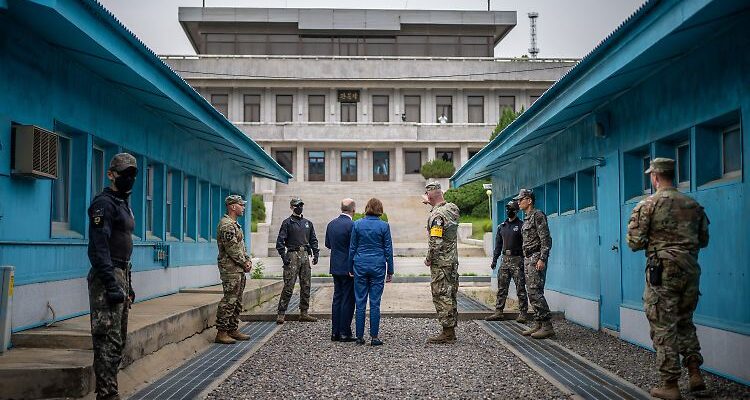“Germany was very lucky”
Scholz visits demilitarized zone in South Korea
05/21/2023, 2:00 p.m
Germany and South Korea have a lot in common. Nevertheless, German heads of government have avoided the country for many years. Chancellor Scholz changes this with a visit to the South Korean capital Seoul, which has not only political but also economic reasons.
Chancellor Olaf Scholz visited the border with communist North Korea in South Korea. Together with his wife Britta Ernst, he looked at the blue barracks in the demilitarized zone (DMZ) along the border, in which the armistice agreement was negotiated, which was concluded in July 1953 after three years of the Korean War. More than a million soldiers face each other on either side of the 38th parallel, which divides Korea into two states. In addition, the US currently has 28,500 troops stationed in South Korea.
Under international law, both Korean states have been at war since the end of their civil war. There was never a peace treaty. Almost half of South Korea’s nearly 52 million people live in the metropolitan area around Seoul, which is close to this border.
His visit to South Korea was a “very important and moving visit for him,” Scholz said after his visit to the DMZ. “Germany is now reunited. It’s very lucky that we have it.” Scholz appealed to North Korea to stop its missile tests. “This attempt to strengthen itself with nuclear power must stop,” said the Chancellor. “This is a threat to peace and security in this region.”
First bilateral visit in 30 visits
Scholz said goodbye to the G7 summit in Japan on the morning of German time and landed at an air force base near the South Korean capital Seoul at noon. After visiting the demilitarized zone, Scholz will meet South Korean President Yoon Suk Yeol before returning to Berlin.
It is the first purely bilateral visit by a chancellor to the country in 30 years. Angela Merkel was only there for a G20 summit in 2010. The main reason for the visit is the threatening dependence of the German economy on China. The Federal Government is endeavoring to broaden relations with other countries in Asia. In this context, a spokesman for Scholz referred to previous visits by the Chancellor to India, Japan, Vietnam, Singapore and Indonesia. South Korea is the fourth largest economy in Asia after China, Japan and India.
“Some relaxation”
According to information from German government circles, Scholz and Yoon will probably also deal with the security policy situation in the Indo-Pacific and how to deal with China, which is heavily armed with military equipment. But the Russian war of aggression in Ukraine should also be an issue. Although South Korea has joined the international sanctions against Russia, it has so far refused to supply arms to Kiev. It refers to its basic policy of not supplying weapons to crisis areas.
In the Yonhap interview, Scholz welcomed South Korea’s humanitarian aid to Ukraine and support for sanctions against Russia. However, he emphasized that each nation decides for itself how to help Ukraine.
The federal government had pointed out in advance that President Yoon had indicated “a certain relaxation” in arms deliveries in recent weeks. The South Korean head of state was also invited as a guest to the G7 summit in Japan, where he held talks with Ukrainian President Volodymyr Zelenskyy.
